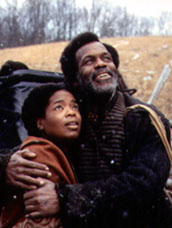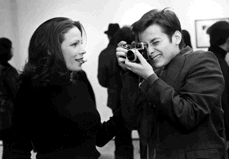Independents' Daze

Speaking of talk show audiences, that substantial demographic didn't help the fortunes of the reigning queen of daytime TV, Oprah Winfrey. Despite her clout, and a massive publicity campaign, her Beloved, which she produced and starred in, proved the year's biggest embarrassment at the box office. Despite respectful reviews, the downbeat melodrama about the after effects of slavery was unloved at the box office. An adaptation of the Pulitzer and Nobel Prize winning novel by Toni Morrison, directed by Oscar-winning Jonathan Demme, Beloved was merely symptomatic of the poor showing of artistically serious and independently minded films in 1998. Indeed, the year was a disaster for films with aspirations beyond the generic; perhaps it was the impact of 1997's Titanic. So much for 1996, when every Academy Award for Best Film nominee was more-or-less an independent production. Or maybe it's because people don't know how to make art films anymore. Despite, or because of, its earnestness, Beloved was wrongheaded from the start, from the village idiot acting of Thandie Newton —who made Winfrey's perfunctory performance seem nuanced— to Demme's flourishes of Sam Raimi-like special effects (Raimi, paradoxically, later made the solid Demme-ish thriller A Simple Plan). Demme wasn't the only auteur to disappoint. John Sayles, who graced 1996 with the stellar Lone Star, shot blanks with Men With Guns. Richard Linklater tried to splice his slacker act onto a period Western with The Newton Boys; nobody gave a fig. Todd Haynes failed to hit paydirt with Velvet Goldmine. Gus Van Sant got lost in his own private Idaho with the compulsive remake of Psycho, though it did make a killing at the box office. Even the granddaddy of transgressive cinema, John Waters, came up with a limp Pecker. Not that there weren't any ambitious films being made; there was just no one interested in seeing them. You wouldn't know it, but there was a renaissance of women's cinema in 1998. Some impressive quick-to-video features were Jill Sprecher's sparkling Clockwatchers, Lisa Chodolenko's lofty High Art, Lisa Skoog's earnest Whatever, and Tamara Jenkins' wise and hilarious Slums of Beverly Hills. Instead, the ostensibly feminist films that garnered attention were The Opposite of Sex, featuring the smug Christina Ricci (the Monica Lewinsky of independent cinema); the patriarchal pap Sliding Doors, with the porcelain Gwyneth Paltrow; and Shekhar Kapur's bombastic period bodice-ripper Elizabeth. Though these films claimed to espouse feminist principles, their bottom line was essentially misogynistic. Perhaps the only independent-minded film empowering women was the overrated Truman Show clone Pleasantville, allowing Joan Allen to have an orgasm and incinerate a tree. As for the mainstream, what passed for a "woman's movie" sentenced the younger established actresses (Renée Zellweger, Julia Roberts) to submission and child rearing, and the older established actresses (Meryl Streep, Susan Sarandon) to terminal cancer — as in One True Thing and Stepmom. |









